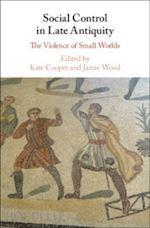Introduction. The violence of small worlds: re-thinking small-scale social control in late antiquity Kate Cooper and Jamie Wood; Part I. Women and Children First: Autonomy, Social Control, and Social Reproduction in the Late Ancient Household: 1. Female crime and female confinement in late antiquity Julia Hillner; 2. Holy beatings: Emmelia, her son Gregory of Nyssa, and the Forty Martyrs of Sebasteia Vasiliki Limberis; 3. Power, faith, and reciprocity in a slave society: domestic relationships in the preaching of John Chrysostom Jonathan Tallon; 4. A predator and a gentleman: Augustine, autobiography, and the ethics of Christian marriage Kate Cooper; Part II. 'Slaves, Be Subject to your Masters': Discipline, Reciprocity, and Moral Autonomy in a Slave Society: 5. Modelling msarrquta: humiliation, Christian monasticism, and the ascetic life of slavery in late antique Syria and Mesopotamia Chris L. de Wet; 6. Constructing complexity: slavery in the small worlds of early monasticism Lillian Larsen; 7. Disciplining the slaves of god: monastic children in Egypt at the end of antiquity Maria Chiara Giorda; Part III. Knowledge, Power, and Symbolic Violence: The Aesthetics of Control in Christian Pedagogy: 8. John Chrysostom and the strategic use of fear Blake Leyerle; 9. The fear of belonging: the violent training of elite males in the late fourth century Jamie Wood; 10. Words at war: textual violence in Eusebius of Caesarea Aaron Johnson; 11. Of sojourners and soldiers: demonic violence in the letters of Antony and the life of Antony Blossom Stefaniw; 12. Coercing the catechists: Augustine's De Catechizandis rudibus Melissa Markauskas; Part IV. Vulnerability and Power: Christian Heroines and the Small Worlds of Late Antiquity: 13. Reading Thecla in fourth-century Pontus: violence, virginity, and female autonomy in Gregory of Nyssa's Life of Macrina James Corke-Webster; 14. Family heroines: female vulnerability in the writings of Ambrose of Milan David Natal; 15. Women on the edge: violence, 'othering', and the limits of imperial power in Euphemia and the Goth Thomas Dimambro.











